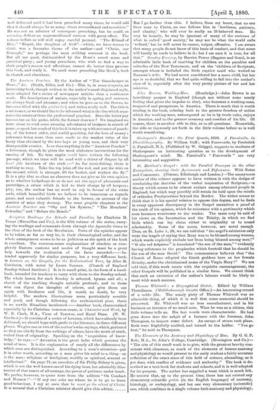Scripture Readings for Schools and Families, by Charlotte 31. Yonge
(Macmillan and Co.), is the fifth volume of the series, carry- ing the readings and comments down through the Apostolic times to the close of the book of the Revelation. Parts of the epistles appear to be taken, as far as may be, in their chronological order, and the whole arrangement seems to be as judicious as the spirit of the book is excellent. The common-sense explanations of obsolete or com- pletely Eastern customs and modes of thought must be a great help towards the realisation of the facts recorded.— In tended apparently for similar purposes, but a very different book, is Lessons on the Gospels, for the Ecclesiastical Year, by Alice M. Cawthorn, with notes by Laura Soames. (Church of England Sunday-School Institute.) It is in small print, in the form of a hand- book, intended for teachers to carry with them to the Sunday-school. The whole lesson for each Sunday is selected, hymns and all ; a sketch of the teaching thought suitable prefixed ; and to those who can digest the thoughts of others, and give them out again with freshness and life, it would, no doubt, be very helpful. The modern illustrations seem particularly sensible and good, and though following the ecclesiastical year, there is no servile Ritualism inculcated.—Another book, characterised especially by its Christian common-sense, is Character and Work, by W. R. Clark, 31.A., Vicar of Taunton, and Rural Dean. (W. W. Gardner.)—It consists of a series of lectures, which have already been delivered, we should hope with profit to the listeners, in three different places. We give one or two of the author's wise sayings, which, gathered as they are chiefly from the writings of others, have the merit of truth, rather than of originality. Speaking on the "acquisition of know- ledge," he says :—" Attention is the great helm which governs the mind of man. It is the explanation of nearly all the differences by which men are distinguished. According to a man's attention—put it in other words, according as a man gives his mind to a thing—so is the man : religious or irreligious, worldly or spiritual, sensual or intellectual." On page 71, an anecdote of Sir Philip Sidney is given, which is not the well known one of his dying hour, but admirably illus- trative of that truest of all courage, the power of patience under insult. We prefer, however, to quote here from the address "On Conduct and Manner :"—" If any one asks me where he is to go to learn good-behaviour, I say at once that he must go the school of Christ It is natural that a Christian minister should give this advice
But I go farther than this. I believe, from my heart, that no one lives near to Christ, no one follows him in 'lowliness, patience, and charity,' who will ever be really an ill-behaved man. He may be homely, he may be ignorant of many of the customs of what is called good society,' he may not be what the world calls 'refined,' but he will never be coarse, vulgar, offensive. I am aware that many people do not know of this basis of conduct, and that some will hardly be made to believe in it; but I am sure it is true, for all that." Sunday Evening, by Harriet Power (Bagster and Sons), is an admirable little book of teaching for children on the parables and miracles of the New Testament, and on the 'children of Scripture, amongst whom is included the little captive maid who waited on Naaman's wife. We had never considered her a mere child, but her- age is so doubtful, that we feel quite willing to fall into the author's view of it, especially after the very pretty picture of her and her mistress.


































 Previous page
Previous page